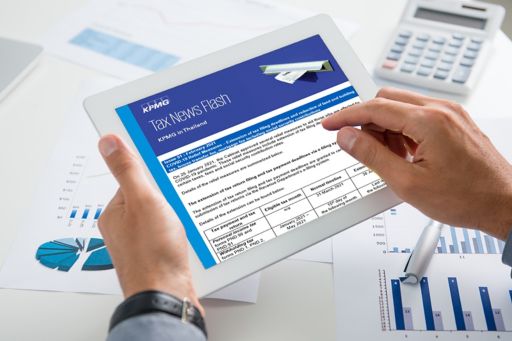Proposed e-commerce law – third draft released
Tax & Legal News Flash Issue 65
The Thai Revenue Department (“TRD”) has issued a third draft of the proposed tax legislative amendments on VAT regulations that will impact foreign e-commerce operators (“foreign companies”) and electronic platforms available to the Thai market. Public hearing process is currently open until 29 January 2020. All public stakeholders are encouraged to submit their comments on the draft amendments. KPMG in Thailand can assist with submissions.

The draft of the proposed legislative amendments to the current VAT provisions of the Revenue Code (“proposed VAT amendments”) was issued on 14 January 2020, and is now in the process of public hearing until 29 January 2020. All interested stakeholders can submit their comments on the third draft of the proposed VAT amendments through the TRD’s website.
Under this draft, the key VAT obligations of foreign companies providing electronic services to non-VAT registered recipients remain unchanged from the previously issued draft. To recap,
- A foreign company that provides electronic services to a non-VAT registered person will be required to register for VAT in Thailand, subject to meeting the THB 1.8 million threshold. The registered foreign company will have an obligation to remit output VAT to the TRD, however, no input VAT offset is allowed. The foreign company will be required to submit VAT return.
- Where a foreign company provides services, receives the payment of service fees and delivers the services through an electronic platform, the electronic platform owner has an obligation to register for and pay VAT on behalf of all foreign companies that use its platform in the above manner. The third draft clarifies that the platform owner is only required to register for VAT once and pay the combined output VAT for all relevant foreign companies.
The key highlights in the third draft of the proposed VAT amendments are:
- The terms “goods”, “electronic services” and “electronic platforms” have been clarified, specifically:
- Any intangible assets transferred via internet network or any other electronic network will be excluded from the definition of “goods”.
- “Electronic service” means a service delivered through internet network or any other electronic network with substantially automated nature and such service cannot be provided without information technology; and
- “Electronic platform” means markets, channels or any other method that several service providers use to provide electronic services to service recipients.
- The self-assessed VAT provision will be amended to explicitly state that (1) a Thai VAT registered person who pays a service fee to a foreign company providing electronic services is required to self-assess VAT on such service fee and remit VAT to the TRD, and (2) the said foreign company is not required to register for VAT in Thailand.
- An electronic VAT registration system may be introduced but this will be further considered by the Minister of Finance. Further details are expected to be released later.
- A foreign company who has registered for Thai VAT for providing electronic services outside of Thailand and where such services are used in Thailand by a non-VAT registered person is prohibited from issuing Thai tax invoices. This means that the foreign company will not be able to pass the VAT cost as tax to consumers.
- Whilst the second draft of the proposed VAT amendments provided that the amendments will be effective 180 days after it is published in the Royal Gazette, this third draft states that the effective date will be the day after the law is published in the Royal Gazette. However, it further states that the amended provisions that relate to VAT payment will be enforced in respect of income received or payment made from the first day of the seventh month from the month that these proposed VAT amendments are published in the Royal Gazette. At this stage, it is unclear when the proposed VAT amendments will be enacted and published in the Royal Gazette following the completion of the public hearing process.
Although the third draft of the proposed VAT amendments provides some clarity on issues previously not addressed, further clarifications and guidance are required on various uncertain aspects as well as practical implications.
KPMG is at the forefront of the developments on this subject and will be pleased to discuss the potential impact of these proposed amendments to your business. KPMG is also preparing a submission to the TRD to be provided before the 29 January 2020 deadline and welcomes your comments and feedback.
Connect with us
- Find office locations kpmg.findOfficeLocations
- kpmg.emailUs
- Social media @ KPMG kpmg.socialMedia


